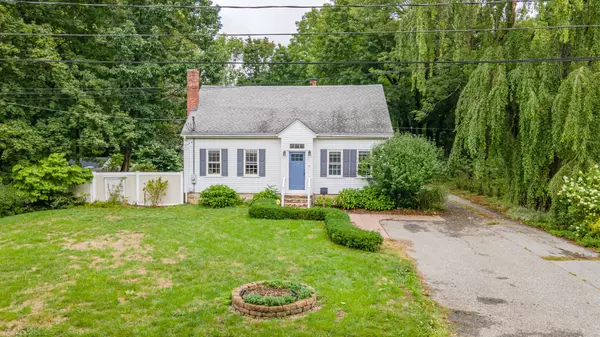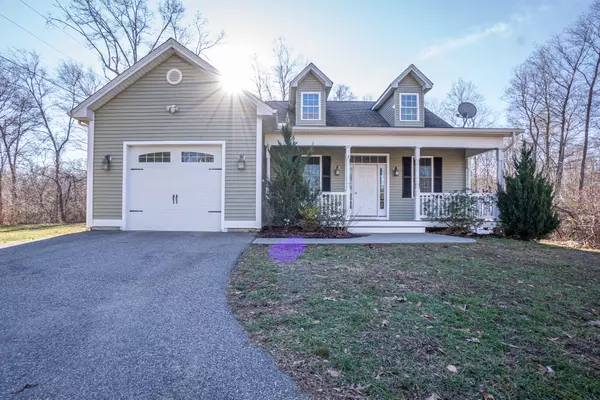Luxury Living at its Finest: Discover the Charm of 77 Old Brown Road in Union, CT

$799,900 3 Beds | 3 Baths | 5,313 SqFt 77 Old Brown Road, Union, CT 06076 Coming Soon Welcome to 77 Old Brown Road, a stunning colonial home situated on picturesque grounds in Union, CT. This remarkable property offers an elevated lifestyle, complete with luxurious features and a beautiful outdoor o
Read MoreIdentifying a lucrative investment property involves considering several key factors:

Identifying a good investment property requires careful consideration and analysis. Here are key factors to help you make informed decisions: Location, Location, Location: Proximity to amenities, schools, transportation, and job centers. Neighborhood trends and potential for growth. Safety and ove
Read More"Unlocking Tax Benefits: Understanding the Basics of 1031 Exchanges in Real Estate"

A 1031 exchange, also known as a like-kind exchange, is a provision in the U.S. tax code that allows real estate investors to defer capital gains taxes when selling one property and reinvesting the proceeds into another similar property. Here's an explanation of the key aspects of a 1031 exchange: L
Read MoreInterior design trends you should know about.

Interior design trends evolve over time, and current styles reflect a mix of timeless elements and contemporary influences. Whether you are a buyer looking to revamp your new home or a seller aiming to stage your property to appeal to potential buyers, staying up-to-date with the latest trends is es
Read MoreModern Living at its Finest: Explore 7 Delaney, Dudley, MA

$375,000 3 Beds | 2 Baths | 1,960 SqFt 7 Delaney, Dudley, MA 01571 Active Welcome to 7 Delaney, a stunning raised ranch in Dudley, MA, that offers modern living at its finest. With a listing price of $375,000, this 3-bedroom, 2-bathroom home is designed to blend style with comfort, making it the per
Read MoreChoosing the right offer for your situation.

In the world of real estate, choosing the right offer can make all the difference in navigating a successful transaction. As both buyers and sellers, it is important to understand that the highest offer may not always be the best offer for your specific situation. Sometimes, other factors such as fi
Read More"Unveiling the Allure: Colonial Charm on 6 Jasmine Drive, Oxford, MA"

Nestled in a serene cul-de-sac of Oxford, MA, this stunning colonial at 6 Jasmine Drive offers spacious comfort and modern elegance. With 2368 square feet of living space, this meticulously maintained residence boasts a blend of classic charm and contemporary allure. Step into a warm welcome as you
Read MoreDiscover New England Charm in this Meticulously Maintained Brooklyn Home

$519,900 3 Beds | 3 Baths | 2,178 SqFt 14 Brown Road, Brooklyn, CT 06234 Coming Soon Are you in search of a home that seamlessly blends New England charm with modern elegance? Look no further than 14 Brown Road, Brooklyn, CT 06234. With a listing price of $519,900, this stunning property offers an a
Read More"Unraveling the Impact: How a Rate Drop Shapes the Real Estate Horizon"

A rate drop, particularly in the context of real estate, refers to a decrease in interest rates set by central banks or financial institutions. This drop can have significant implications for the real estate market: Increased Affordability: Lower interest rates mean reduced borrowing costs for homeb
Read More-

Off-market deals, also known as pocket listings or private sales, occur when a property is sold without being listed on the Multiple Listing Service (MLS) or public marketing channels. Here's how off-market deals can benefit your clients: Exclusive Access: Off-market deals offer clients exclusive ac
Read More -

Winning a bidding war on a home can be challenging, but with a strategic approach and careful planning, you can improve your chances. Here are some tips to help you succeed: 1. Be Prepared: Get Pre-Approved for a Mortgage: This shows sellers you're a serious and financially capable buyer. It can als
Read More Appraisers and What They Look For

Appraisers play a critical role in the home buying and selling process by determining the fair market value of a property. They consider a wide range of factors when conducting their evaluation. Here's a list of what appraisers typically look for when appraising a property: Property Condition: Appra
Read More-

Home Buying Process Checklist Buying a home can be a complex process, but breaking it down into steps can make it more manageable. Here's a checklist to guide you through the home buying journey: 1. Financial Preparation: Check and improve your credit score if necessary. Determine your budget, inclu
Read More -

Buying a vacation home can be an exciting and rewarding investment, providing a place for relaxation and potential rental income. Here's a step-by-step guide to help you navigate the process: 1. Determine Your Goals: Consider why you want a vacation home. Is it for personal use, rental income, or a
Read More -

FHA (Federal Housing Administration) loans and conventional loans are two common types of mortgages, each with its own set of characteristics and requirements. Here's a comparison of FHA and conventional loans to help you understand the differences: FHA Loan: Government-Backed: FHA loans are insured
Read More -

Getting preapproved for a home loan is an important first step in the home buying process. It helps you determine how much you can afford and demonstrates to sellers that you're a serious buyer. Here's a step-by-step guide to getting preapproved for a home loan: 1. Check Your Credit Report: Obtain a
Read More Renting vs. Buying: Making the Right Housing Decision

🏡 Renting vs. Buying: Making the Right Housing Decision 🤔 Deciding between renting and buying a home is a major financial and lifestyle choice. Both options have their advantages and considerations, so it's important to evaluate your circumstances and goals. To help you make an informed decision,
Read MoreThe Closing Process in Real Estate: A Comprehensive Overview

🔑 The Closing Process in Real Estate: A Comprehensive Overview 🏡 The closing process is a crucial step in any real estate transaction. It's the final stage where all the necessary paperwork is signed, funds are transferred, and ownership of the property is officially transferred from the seller to
Read MoreTips on Getting Your Buyer's Offers Accepted in a Competitive Real Estate Market

In today's competitive real estate market, getting your buyer's offers accepted can be a challenging task. With limited inventory and multiple competing buyers, it's crucial to stand out from the crowd. To increase your chances of success, here are some valuable tips to help you secure that dream ho
Read MoreCommon Questions Relocation Clients Ask: A Guide to Navigating Your Move

🌎 Common Questions Relocation Clients Ask: A Guide to Navigating Your Move 🤔 Relocating to a new city or even a new country can be both exciting and daunting. As a relocation client, you likely have many questions about the process, the new location, and what to expect. To help you navigate this t
Read More
Categories
Recent Posts










